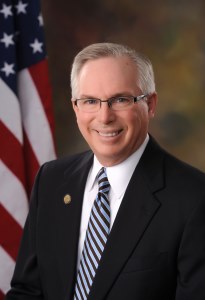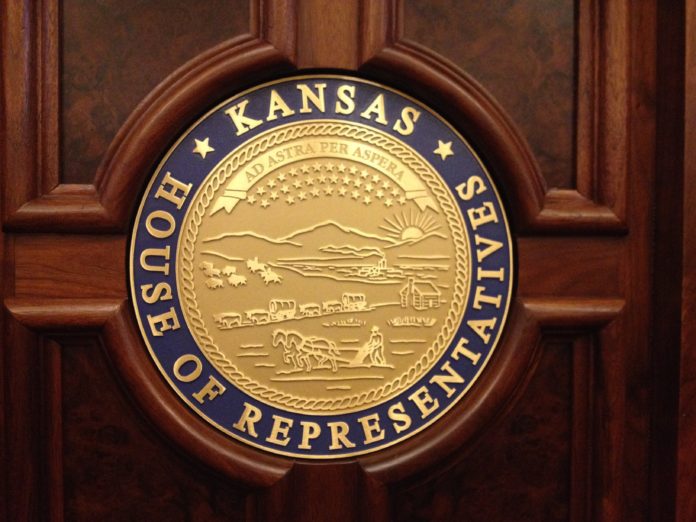Even as eyes across Kansas zero in on the Kansas governor’s race, dozens of other campaigns are playing out locally that could decide the state’s political agenda for the next two years.
As much as a new governor can chart a new course for Kansas, the Legislature will have some say in that direction, a heading that could be decided in the Aug. 7 primary.
The Republicans’ hold on the Kansas House is now split between the moderate wing with 41 members and the conservative wing with 44 members although those numbers can be fluid depending on the issue. The Democrats count 40 members in their caucus.
However, there are about 28 House primaries that could affect those numbers, which could come into play in leadership elections and committee assignments. Seventeen of those districts are now represented by moderates. Eleven are represented by conservatives.
The outcome of those primary races – and ultimately the general election in some cases – could determine the Legislature’s agenda as the state transitions to a new era of leadership.
The new composition of the House, for instance, could be asked to address a recent court ruling that struck down a 2013 change in the workers’ compensation law that provides for smaller settlement claims in those cases.
The House makeup could play a key role in deciding whether there are enough votes to pass a constitutional amendment on abortion if the state Supreme Court rules it’s protected by the state Constitution.
A shift in the moderate/conservative split could determine whether there are enough votes to tax the internet, return a revenue windfall from federal tax reform, comply with a state Supreme Court ruling on school funding or reverse a faith-based adoption bill that narrowly passed last session.
It’s an ideological battle being fought statewide with yard signs lining neighborhoods, automated phone calls and postcards filling up mailboxes. There are also various interest groups pouring thousands into local races where they’ve backed candidates.
“The postcards are flying from both directions,” said House Majority Leader Don Hineman, whose leadership position could hinge on the outcome of these Republican races.

“There are a lot of hotly contested races,” Hineman said “Anyone who says they know how it’s all going to turn out next Tuesday, they’re either a very good fortune teller or they’re just blowing smoke.”
Conservatives are mounting challenges in 17 districts that are now held by moderates in an effort to return serve from two years ago when 14 conservative incumbents were knocked out amid budget woes blamed on then-Republican Gov. Sam Brownback’s tax cuts.
Last year, the Legislature repealed most of those tax cuts, giving ammunition to conservatives who are campaigning against moderate incumbents who are now blamed for raising taxes.
“I don’t believe that voters in any part of the state want to go back to Brownback,” said Stephanie Sharp, a consultant for moderate political candidates. “I think moderates will be fine.”
Others supporting conservatives don’t quite see it that way.
They think the state swung too far left after the 2016 elections and the state is poised to move back the other way after an election that was focused on the Brownback era.
“The pendulum didn’t swing to the middle from such a far-right state, but it did swing quite a way to the left,” said former state Rep. Kasha Kelley, who lost her re-election bid in 2016 and now chairs the newly formed political action committee affiliated with the Kansas Truth Caucus.

“If that’s what Kansans want, then by all means they should retain the folks that are in,” Kelley said.
“If they’re wanting a more common-sense approach to the really key issues that govern this state then you probably need to pull back a little bit.”
Looking across the state, conservatives are mounting challenges against moderates in districts that were carried by President Donald Trump in 2016, sometimes with as much as 77 percent of the vote.
Tightly contested races are seen in House District 42 where state Rep. Jim Karleskint of Tonganoxie is locked in a primary with Lance Neelly and House District 75 where former state Rep. Will Carpenter is seeking to unseat incumbent Mary Martha Good of El Dorado.
Among the GOP primary races where spending is heaviest is District 28 in Johnson County where Rep. Joy Koesten is fending off a challenge from Kellie Warren, the wife of Kansas Speedway President Pat Warren.

Koesten raised the second most of any House candidate this year in a race where both candidates have spent a little more than $50,000 combined and could exceed $80,000.
Koesten lives in a district that was carried by Donald Trump with 52 percent of the vote in 2016 and Brownback with 58 percent in 2014.
“I’m tired of the crazy far right driving the agenda of our state,” Koesten said. “It’s not how we’ve operated in the past. If we don’t fight now, we won’t have anything worth fighting for.”
Koesten knocked out conservative state Rep. Jerry Lunn in 2016. She then voted to repeal the Brownback tax cuts the following year.
On her website, Koesten said that voting to repeal the tax cuts was “responsible government” and it was “long overdue” so the state could dig itself out of the budget deficits they caused.
Now, she’s fighting for a second term against a candidate who she says is a hard-core conservative.
The Kansas Truth PAC recently targeted Koesten with a mailing accusing of her being too far left.
“I just don’t believe that the people in my district are all Truth Caucus people,” she said.
“I think they are regular professionals – highly educated, certainly very affluent people – who love our schools. I don’t think she represents these people out here.”
Warren disagrees.

“It would be a stretch to call Joy’s record as centrist as her votes align with Democrats on every major issue. I believe voters want real Republicans in office who are solutions-driven,” Warren said in an email.
“I believe my views are the best fit for the district,” Warren wrote. “It should be no surprise that organizations whose positions largely reflect the Republican Party are supporting me over my opponent.”
Warren pointed to support that Koesten received from the state’s largest teachers’ union and the MainStream Coalition’s political action committee as indicators of her liberal leanings.
Warren, meanwhile, has the support of the Kansas Chamber of Commerce, one of the state’s conservative heavyweights.
The chamber has kicked in about $8,300 into the race on behalf of Warren for phone work, digital ads and production as well as printing and postage.
Warren is one of 18 conservative candidates the chamber is supporting with political work in the primaries. Overall, the chamber is spending about $150,000 in those races.
The Kansas Chamber has been the focus of criticism for years, going as far back as 2012 when it opposed moderate Senators running for re-election in a campaign ultimately won by conservatives. The defeat of so many moderates gave conservatives control of the chamber, clearing the way to approve many Brownback policies.
It’s not very different from this year when Stand Up Blue Valley is backing moderate candidates in Johnson County and criticizing the influence exerted by groups like the chamber.
The group’s Facebook page has a variety of posts pointing out which candidates have received money from the chamber and Koch Industries, which contributes to the chamber’s political action committee.
“All three contested races where we’ve endorsed a moderate, pro-public education Republican, ultraconservative opponents and outside organizations have made claims that the moderates are…too moderate,” said one posting. “They’re not extreme enough to suit ultra-conservatives.”
The chamber says its PAC’s endorsements are not about labels but more about voting records, public comments and scorecards reflecting how candidates’ vote on issues that foster business growth.
“In general, the self-described conservative supports policies that are good for business and the economy and the self-described moderate is not as consistent,” said chamber spokeswoman Sherienne Jones-Sontag
“If there was a Democrat candidate who believed in a free-enterprise system and voted for legislation important to the Kansas business community, the chamber would support them,” Jones-Sontag said.
Another race where the chamber is involved is District 104 where state Rep. Steve Becker is facing a stiff re-election fight from Hutchinson businessman Paul Waggoner.
It’s the district once represented by former House Speaker Mike O’Neal, a former chamber president. The district went for Trump with 64 percent of the vote in 2016 and for Brownback with 51 percent in 2014.

The two candidates have spent a little more than $30,000 combined for the election this year.
Waggoner has assailed Becker in mailers, criticizing the incumbent for being politically being out of step with the district. One postcard superimposed Becker’s face on a donkey. The ad read, “Pin the Tail on the Democrat.”
Waggoners’ mailers ripped Becker for a wide range of issues, including his support for repealing the Brownback tax cuts and “religious intolerance” for voting against the faith-based adoption bill – legislation that critics said discriminated against LGBT parents.
To make a point during the campaign about religious freedom, Waggoner bought brownies and cookies for a fundraiser from the Colorado bakery that refused to make a cake for a same-sex couple because of the owner’s religious faith. The bakery ultimately prevailed in a highly-watched U.S. Supreme Court case.

Becker said tax policy has emerged as a major issue in the campaign. He said it was time to end the “Brownback tax experiment” and put the state on steady financial ground and pay for essential government services.
Two years ago, he sensed the public was supportive of a change in tax policy as the state wrestled with budget deficits. Now, maybe it’s different.
“Two years into it, people are already starting to forget where we were,” Becker said. “They aren’t as supportive of that change as they were in ’17. I don’t know what it is.
“Waggoner’s position is getting a lot of support in my district,” Becker said. “Yeah, it’s going to be a tight race and that surprises me a little bit.”
Few are willing to guess how the House races will turn out, but some Capitol observers believe no more than five seats will change hands in the primary – if that many.
Some leaders, such as Hineman, like the balance of power in the House the way it is now.
It is impossible for one bloc of lawmakers to get anything done without getting help from another group of legislators.
“It has forced us to come together and work together for a common end. I think that’s healthy,” Hineman said.
“When one wing of the caucus is low enough in numbers that they’re pretty much shut out, that is not very healthy,” Hineman said, “either for policy making or for the caucus.”
















